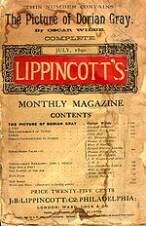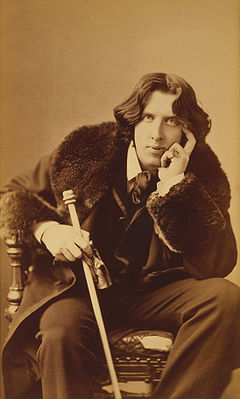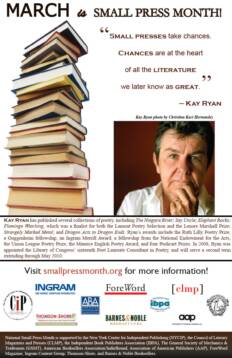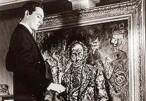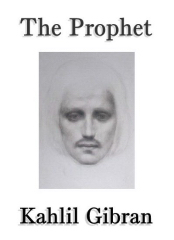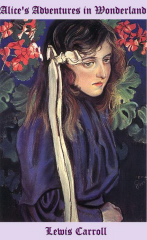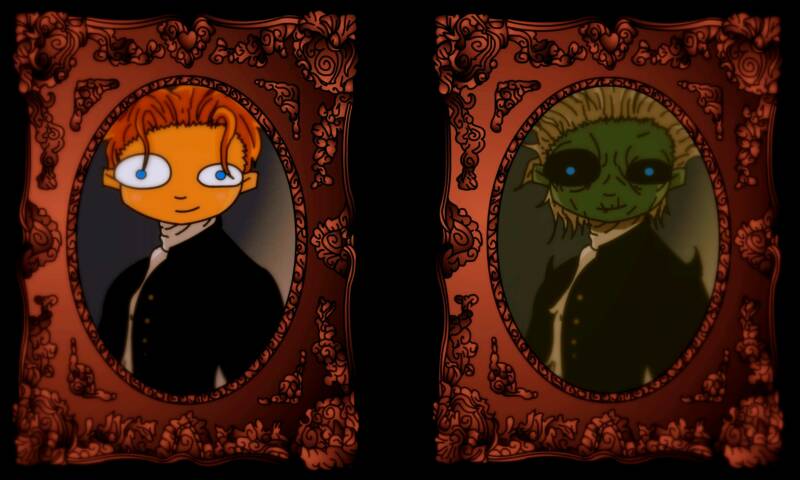© 2009 Moronic Ox Literary Journal - Escape Media Publishers / Open Books
Moronic Ox Literary and Cultural Journal - Escape Media Publishers / Open Books
Novel Excerpts, Short Stories, Poetry, Multimedia, Current Affairs, Book Reviews, Photo Essays, Visual Arts Submissions
Advertise your book, CD, or cause in the 'Ox'
Audio Classic
e.
Plot summary
The novel begins with Lord Henry Wotton observing the artist Basil Hallward painting the portrait of a handsome young man named Dorian Gray. Dorian arrives later and meets Wotton. After hearing Lord Henry's world view, Dorian begins to think beauty is the only worthwhile aspect of life, the only thing left to pursue. He wishes that the portrait Basil is painting would grow old in his place. Under the influence of Lord Henry, Dorian begins to explore his senses. He discovers actress Sibyl Vane, who performs Shakespeare in a dingy theatre. Dorian approaches her and soon proposes marriage. Sibyl, who refers to him as "Prince Charming," rushes home to tell her skeptical mother and brother. Her protective brother James tells her that if "Prince Charming" harms her, he will certainly kill him.
Dorian invites Basil and Lord Henry to see Sibyl perform in Romeo and Juliet. Sibyl, whose only knowledge of love was love of theatre, loses her acting abilities through the experience of true love with Dorian. Dorian rejects her, saying her beauty was in her art, and he is no longer interested in her if she can no longer act. When he returns home he notices that his portrait has changed. Dorian realizes his wish has come true – the portrait now bears a subtle sneer and will age with each sin he commits, whilst his own appearance remains unchanged. He decides to reconcile with
The Picture of Dorian Gray
novel by Oscar Wilde
audio text by Aaron Quinn adapted from Wilde's published version
Read by Basil Soper
About The Picture of Dorian Gray
The Picture of Dorian Gray is the only published novel by Oscar Wilde, appearing as the lead story in Lippincott's Monthly Magazine on 20 June 1890, printed as the July 1890 issue of this magazine. Wilde later revised this edition, making several alterations, and adding new chapters; the amended version was published by Ward, Lock, and Company in April 1891. The story is often mistitled The Portrait of Dorian Gray.
Oscar Fingal O'Flahertie Wills Wilde (16 October 1854 – 30 November 1900) was an Irish writer, poet and prominent aesthete. His parents were successful Dublin intellectuals, and from an early age he showed his intelligence, becoming fluent in French and German, then an outstanding classicist, first at Dublin, then at Oxford. After university, Wilde moved around trying his hand at various literary activities: he published a book of poems, then toured America lecturing extensively on aestheticism. Returning to London he worked prolifically as a journalist for four years. Known for his biting wit, flamboyant dress, and glittering conversation, Wilde had become one of the most well-known personalities of his day. He produced a series of dialogues and essays that developed his ideas about the supremacy of art. Though, it was his only novel, The Picture of Dorian Gray - still widely read - that brought him more lasting recognition. He became one of the most successful playwrights of the late Victorian era in London with a series of social satires which continue to be performed, especially his masterpiece The Importance of Being Earnest.
At the height of his fame and success, he suffered a dramatic downfall in a sensational series of trials. Wilde sued his lover's father for libel, the case went to trial, but was dropped. Wilde then imprisoned for two years' hard labour after being convicted of "gross indecency" with other men. In prison he wrote De Profundis, a dark counterpoint to his earlier philosophy of pleasure. After release from prison he set sail for Dieppe by the night ferry, never to return to Ireland or Britain. In France he wrote The Ballad of Reading Gaol, a long, terse poem commemorating the harsh rhythms of prison life, but no further creative work. He died destitute in Paris at the age of forty-six.
Oscar Wilde
Basil Soper enjoys a wide-ranging background of experience in the artistic, administrative and tech- nical areas of the enter- tainment profession, and has a BA Degree in the
The novel tells of a young man named Dorian Gray, the subject of a painting by artist Basil Hallward. Basil is impressed by Dorian's beauty and becomes infatuated with him, believing his beauty is responsible for a new mode in his art. Talking in Basil's garden, Dorian meets Lord Henry Wotton, a friend of Basil's, and becomes enthralled by Lord Henry's world view. Espousing a new hedonism, Lord Henry suggests the only things worth pursuing in life are beauty and fulfilment of the senses. Realizing that one day his beauty will fade, Dorian cries out, expressing his desire to sell his soul to ensure the portrait Basil has painted would age rather than himself. Dorian's wish is fulfilled, plunging him into debauched acts. The portrait serves as a reminder of the effect each act has upon his soul, with each sin displayed as a disfigurement of his form, or through a sign of aging. The Picture of Dorian Gray is considered a work of classic gothic horror fiction with a strong Faustian them
Performing Arts. He is a skilled theatre director in both serious drama and light entertainment, and also an experienced radio presenter and producer. With his rich, warm voice he is in demand as a narrator, presenter and voice-over artist for radio, television, film, corporate video and audio-books.
As an Actor and Theatre Company Manager, he appeared twice in the West End; frequently toured the UK, and enjoyed a long and highly successful tour of Amadeus throughout South Africa. He was offered an immediate contract there as a radio presenter and actor, and narrated more than forty episodes of the top-rated radio drama series The Kappilan of Malta.
He has written and narrated concert versions of many of the Gilbert & Sullivan Operettas, and was a regular writer and presenter of the “Passion of the Tenors” Classical Concerts, [starring Russell Watson]. He now presents for the English National Philharmonic Orchestra for their range of live concerts.
His television appearances include Live from the London Palladium; Live from Her Majesty’s; Night of 100 Stars from The National Theatre, all supporting Russ Abbot; My Secret Desire for Granada TV; and several plays for BBC and Granada.
His voice appeared weekly for the last four seasons as “The Voiceover Man” in the BBC TV Children’s Series The Basil Brush Show.
For some five years, he was the In-Vision Presenter for the Personal Injury Helpline TV campaign throughout the UK and Europe.
Sibyl, but Lord Henry arrives in the morning to say Sibyl has killed herself by swallowing prussic acid (hydrogen cyanide). With the persuasion and encouragement of Lord Henry, Dorian realizes that lust and looks are where his life is headed and he needs nothing else. That marks the end of Dorian's last and only true love affair. Over the next 18 years, Dorian experiments with every vice, mostly under the influence of a "poisonous" French novel, a present from Lord Henry. Wilde never reveals the title, but his inspiration was possibly drawn from Joris-Karl Huysmans's À rebours (Against Nature) due to the likenesses that exist between the two novel.
One night, before he leaves for Paris, Basil arrives to question Dorian about rumours of his indulgences. Dorian does not deny his debauchery. He takes Basil to the portrait, which is as hideous as Dorian's sins. In anger, Dorian blames the artist for his fate and stabs Basil to death. He then blackmails an old friend named Alan Campbell, who is a chemist, into destroying Basil's body. Wishing to escape his crime, Dorian travels to an opium den. James Vane is nearby and hears someone refer to Dorian as "Prince Charming." He follows Dorian outside and attempts to shoot him, but he is deceived when Dorian asks James to look at him in the light, saying he is too young to have been involved with Sibyl 18 years earlier. James releases Dorian but is approached by a woman from the opium den who chastises him for not killing Dorian and tells him Dorian has not aged for 18 years.
While at dinner, Dorian sees James stalking the grounds and fears for his life. However, during a game-shooting party a few days later, a lurking James is accidentally shot and killed by one of the hunters. After returning to London, Dorian informs Lord Henry that he will be good from now on, and has started by not breaking the heart of his latest innocent conquest, a vicar's daughter in a country town, named Hetty Merton. At his apartment, Dorian wonders if the portrait has begun to change back, losing its senile, sinful appearance now that he has given up his immoral ways. He unveils the portrait to find it has become worse. Seeing this, he questions the motives behind his "mercy," whether it was merely vanity, curiosity, or the quest for new emotional excess. Deciding that only full confession will absolve him, but lacking feelings of guilt and fearing the consequences, he decides to destroy the last vestige of his conscience. In a rage, he picks up the knife that killed Basil Hallward and plunges it into the painting. His servants hear a cry from inside the locked room and send for the police. They find Dorian's body, stabbed in the heart and suddenly aged, withered and horrible. It is only through the rings on his hand that the corpse can be identified. Beside him, however, the portrait has reverted to its original form.
Criticism
Overall, initial critical reception of the book was poor, with the book gaining "certain notoriety for being 'mawkish and nauseous,' 'unclean,' 'effeminate,' and 'contaminating.'" This had much to do with the novel's homoerotic overtones, which caused something of a sensation amongst Victorian critics when first published. A large portion of the criticism was levelled at Wilde's perceived hedonism, and its distorted views of conventional morality. The Daily Chronicle of 30 June 1890 suggests that Wilde's novel contains "one element...which will taint every young mind that comes in contact with it." The Scots Observer of 5 July 1890 asks why Wilde must "go grubbing in muck-heaps?” Wilde responded to such criticisms by curtailing some of the homoerotic overtones, and by adding six chapters to the book in an effort to add background.
Read this timeless classic online FREE
courtesy of
Read this timeless classic online FREE
courtesy of
by David A. Ross
Cornelius Valentine is a young, passionate and very talented sculptor living on the Left Bank in Paris. Obsessed with his work, he treats others - including his lover Ariel, who is also his model - with a fickle, laissez-faire carelessness that often seems arrogant and disregarding. Even though he understands he loves Ariel, he also knows he loves his work more. After their affair ends abruptly, and badly, he retreats to a village in the South of France to attempt his masterwork.
There, in the medieval village of Seillans, a delusional local artisan named Sylviane Raynard confuses Cornelius with a figure in her past - the celebrated Dada artist Max Ernst. Seeking revenge for unrequited love, she sets out to both befriend and slowly poison the young artist.
As Cornelius becomes increasingly ill from the poison cunningly administered by his nemesis Sylviane, he continues day by day to chip away at a massive stone in an attempt to reveal his 'impossible' masterwork. Monitoring his progress, as well as the progress of her well-planned revenge, Sylviane descends deeper into the realm of her contorted memories.
Each artist - Cornelius and Sylviane - plays out his drama with dedicated passion, alone and little understood, yet each must ultimately share the same existential dilemma: what happens when one fails both in love and art?

